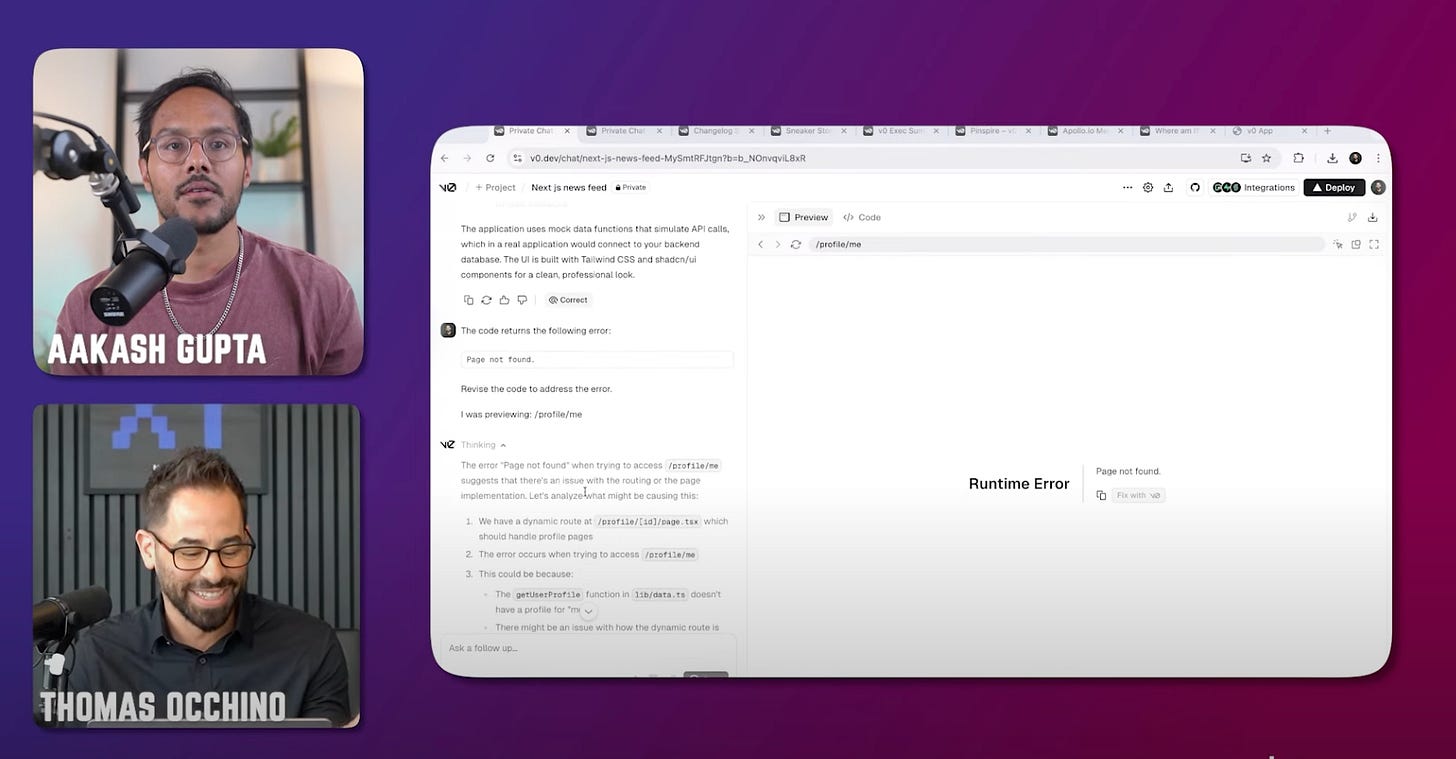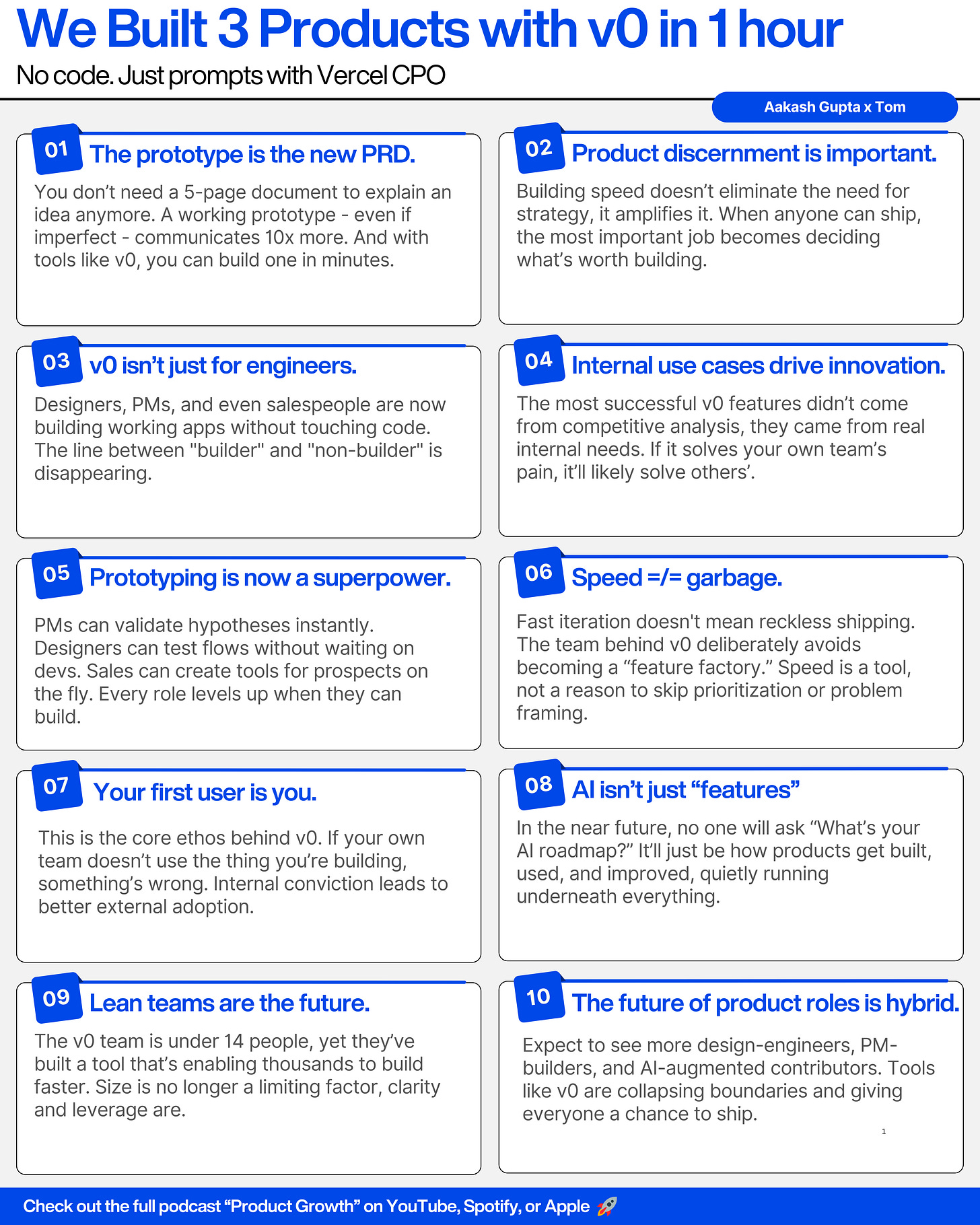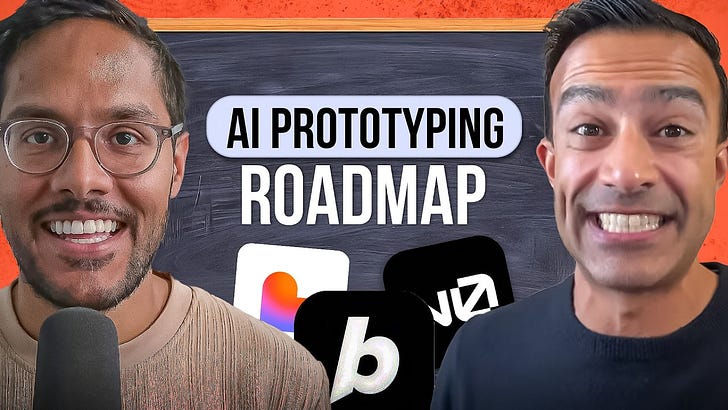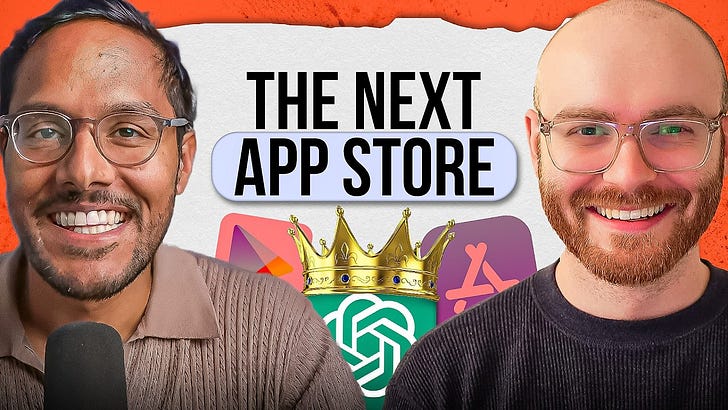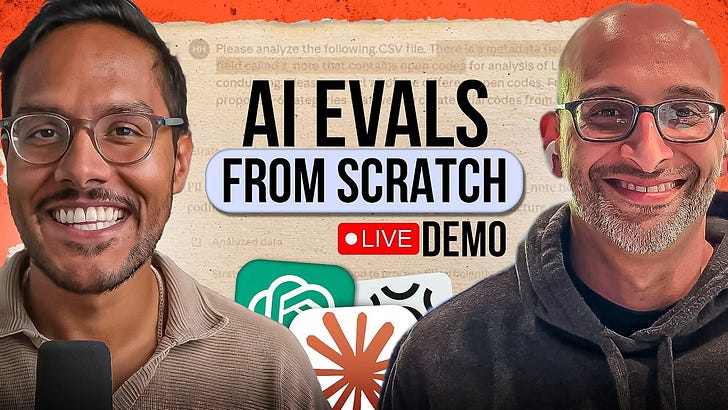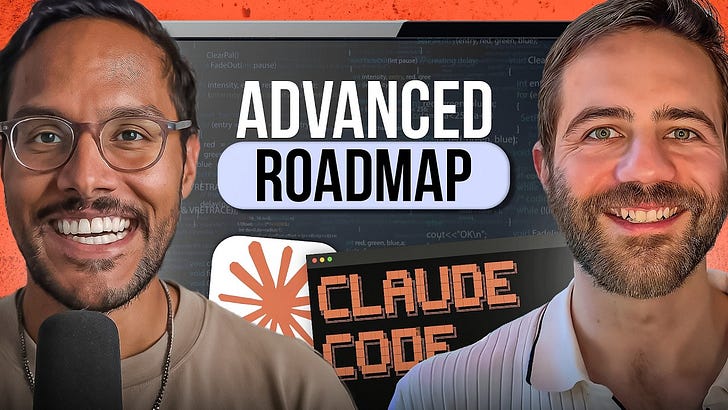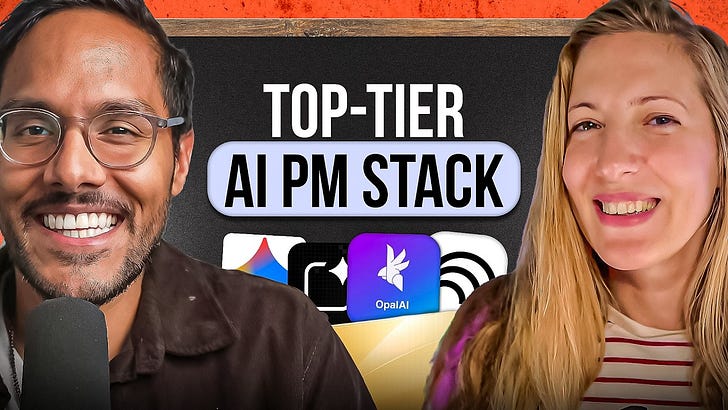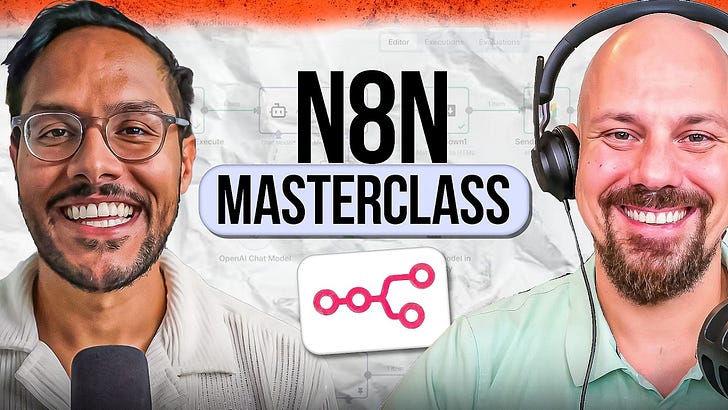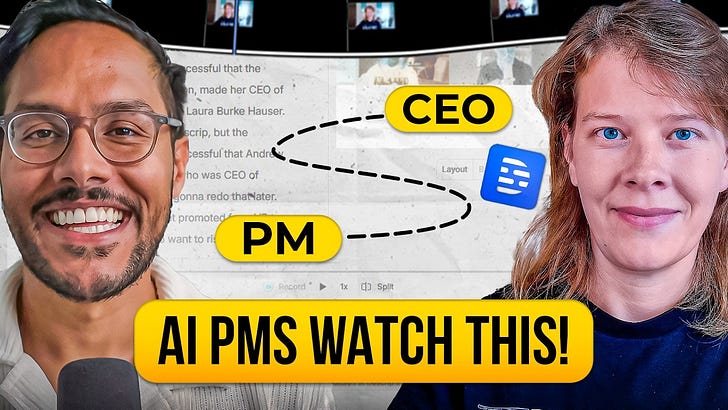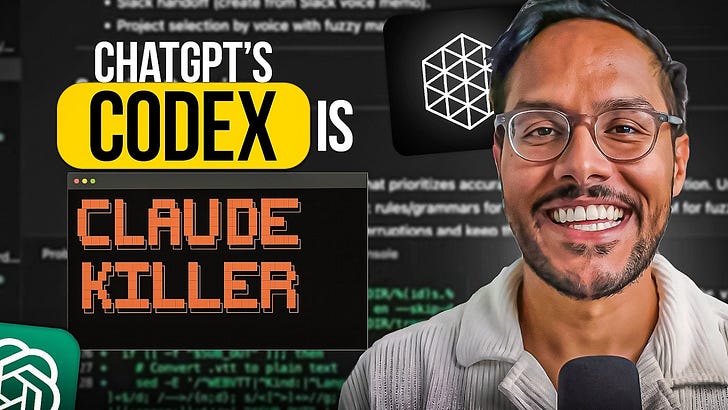Check it out on Apple, Spotify, or YouTube.
Brought to you by:
WorkOS: Your app, enterprise ready
Jira Product Discovery: Plan with purpose, ship with confidence
The AI Evals Course for PMs & Engineers: You get $800 with this link
Product Faculty: Get $500 off the AI PM certification with code AAKASH25
Today’s Episode
“My whole Product, design, and engineering team has v0 licenses.”
That’s what Jeremy Epling, CPO at Vanta, said in a recent episode.
So, I went straight to the source.
I sat down with the CPO of Vercel to unpack why v0 is becoming the tool for modern product and engineering teams alongside vibe coders.
We cover:
The future of AI prototyping for PMs and designers
How v0 builds product
A full tutorial of v0
Whether you’re a PM trying to stay ahead, a founder rethinking velocity, or a builder curious about what’s next, this episode is for you.
If you liked my episode with the CEO of Bolt, you’ll love this.
Here’s a quick preview of what we discussed…
1. The future of AI prototyping for PMs and designers
Tom said it perfectly: "In my mind, the sooner you can demo and validate your hypothesis, the better."
How the game has changed
What used to take weeks:
PM writes detailed PRD
Designer creates mocks
Engineer builds MVP
Feedback reveals gaps
Rinse and repeat
What now takes minutes:
Single prompt becomes working app
Stakeholders interact with real software
Edge cases surface immediately
Iterations happen in real-time
PRDs aren't dead, they're evolving
But here's the key insight Tom shared: PRDs still matter, they just get thinner and more strategic.
"I actually think that you can't capture all of the nuance and all of the edge case and the strategy in the demo. But I do think these things, the PRD can get a little thinner now, and it can be more high level, more strategic, more opportunity sizing, more analysis."
Action for PMs: Start prototyping before writing lengthy specs. Use the prototype to expose assumptions and edge cases, then write strategic context around it.
Action for Designers: Don't abandon Figma, but use AI prototyping to quickly test interaction patterns and flows before pixel-perfect designs.
2. How v0 builds product
Everyone at Vercel builds now. And it's transforming how they work.
The AE who replaced spreadsheets with apps
Tom shared a story that perfectly captures this shift:
An account executive used to send TCO spreadsheets to prospects. Instead, he built an interactive v0 app that let customers filter by scenario, headcount, and growth in real-time.
"The customer was elated. They're like, I can see it. I can understand how this is going to pay dividends for us."
The new Demo Day reality
Engineers: Still demo technical features
Designers: Demo partial flows and interactions
PMs: Demo end-to-end user experiences
Sales: Demo live, personalized ROI calculators
Marketing: Demo interactive presentations
Team efficiency insight: v0's team of <14 people ships at the velocity of much larger teams because they leverage the existing Vercel infrastructure (accounts, billing, deployment, marketplace).
Action for Leaders: Give non-technical team members prototyping tools. You'll unlock creativity you didn't know existed and reduce bottlenecks between ideas and validation.
Action for PMs: Use demos, not docs, as your primary communication tool. Tom's team shipped integrations with "demos and loom videos and conversation" – no PRD required.
3. A full tutorial of v0
We built three apps live on the podcast.
Here's what you need to know to use v0 like Tom:
Two starting approaches that work
Approach 1: Start from nothing
Give v0 a vague idea and let it run. Tom's tip: "Use prompt enhancement" to let v0 expand your basic concept into a full feature set.
Approach 2: Start with a screenshot
Upload an image of existing UI and ask for modifications. This is incredibly powerful for copy-and-improve workflows.
Tom's iteration methodology
Make atomic changes: "I'll usually do one thing at a time. And it feels more like a pull request to me. My next pull request is going to be adding the calendar widget."
Use restore points: When experiments fail, scroll back to previous versions instead of debugging manually.
Deploy immediately: Test with real users, not just internal reviews.
When to stay in v0 vs. export to code
Stay in v0 if:
You're learning to code
Building personal tools
Rapid prototyping phase
Export to IDE if:
You're an experienced developer
Need team collaboration
Building production systems
Pro tip: v0 generates React code that works at scale. Tom noted that everything from OpenAI.com to UnderArmor.com runs on the same Vercel infrastructure.
The feature factory warning
Tom's caution:
"You talk to one customer and want to make their dreams come true. Now, you actually can, in five minutes."
The PM skill becomes more important, not less.
Deciding what's worth building vs. what's just a fun prototype.
Strategic thinking and product discernment matter more than ever when anyone can build anything.
Key Takeaways
And don’t miss the story of how Tom landed the gig at Vercel:
Related
Newsletters:
Podcasts:
We Built an AI Agent to Automate PM in 73 mins (ZERO CODING)
We Built an AI Product Manager in 58 mins (Claude, ChatGPT, Notion AI)
Where to Find Tom
LinkedIn: Tom
Website: www.tomocchino.com
Company: vercel
v0: v0.dev
If you prefer to only get newsletter emails, unsubscribe from podcast emails here.
If you want to advertise, email productgrowthppp at gmail.
Up Next
I hope you enjoyed the last episode with Brett (where we discussed how he built a $2M/y one person productized agency). Up next, we have episodes with:
Aman Khan - AI PM @ Arize AI, Spotify, Cruise
John Beckmann - Head of Meetings Product, Zoom
Tanguy Crusson - Head of Product, Jira Product Discovery
Finally, check out my latest deep dive if you haven’t yet: AI Evals: Everything You Need to Know to Start.
Cheers,
Aakash


